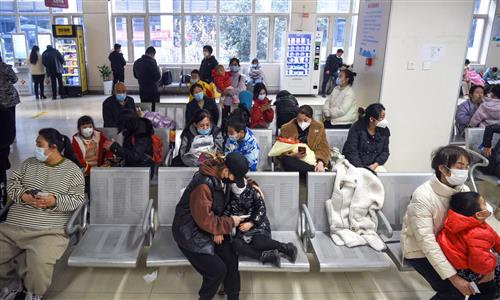Influenza dominates acute respiratory diseases in China, with influenza B prevailing at relatively high proportion

A resident receives a flu vaccine at a community health service center in Shenyang, Northeast China’s Liaoning Province, on November 15, 2023. Respiratory diseases have progressed to their peak period of incidence across China, posing a threat to vulnerable groups such as children and the elderly. Photo: VCG
The COVID-19 epidemic currently remains at a relatively low level across China while influenza dominates the acute respiratory diseases in the country, with a relatively high proportion of influenza B as the prevailing disease, an expert from the Chinese Center for Disease Control and Prevention (Chinese CDC) announced on Thursday.
During a press conference held by China’s National Health Commission on Thursday, Peng Zhibin, director of the respiratory infection disease department of infectious disease management division under the Chinese CDC, said that the overall COVID-19 epidemic situation across the country currently remains at a relatively low level with monitoring data, including the reports of cases and the positivity rate tested at sentinel hospitals, showing an increasing sign, but only a small increase.
According to Peng, the proportion of the local JN.1 variant continues to rise. Its clinical presentations are mainly asymptomatic and mild. There is no significant change in the severity of the disease compared to that caused by the EJ.5 variant.
It is expected that the COVID-19 epidemic situation may experience a certain degree of resurgence around the Spring Festival due to multiple factors such as large-scale population movements, family visits, gatherings and increased social activities, Peng said.
Peng further said the monitoring data indicate that respiratory diseases in China reached their peak in early December of 2023, and then experienced a slight decline for two consecutive weeks. They saw a minor rebound at the end of December of 2023, and have since been continuing to fluctuate at elevated levels. The respiratory diseases started to decline over the past week.
Diseases caused by influenza currently remain the dominating diseases among the acute respiratory diseases in China, while other respiratory diseases remain at relatively low levels. Among the various influenza, the proportion of influenza B has been increasing, leading to a minor fluctuation in the influenza epidemic, Peng said.
According to Peng, experts assess that during the winter and spring seasons, China will continue to experience the alternating or concurrent prevalence of various respiratory diseases, with influenza viruses remaining predominant in the short term.
Despite of the current downward trend in influenza activity, it is expected to return to the epidemic level around the end of January, as schools gradually start their vacations, Peng said.
Global Times



